World Sickle Cell Day
- Jenetta Greaves

- Sep 16, 2023
- 9 min read
Updated: Jul 23, 2024

Did you know that there is a World Sickle Cell Day... Me neither.

I have to say that I am both surprised and pleased with the growing acknowledgment and services for Sickle Cell.
As a child who was in and out of foster care because of this illness and the lack of support for it, I can see that strides have been taken to shine a light on it due to the efforts of the Sickle Cell community.
Being raised by a parent who heavily suffers from Sickle cell, I can confirm that it is quite stressful the constant worry you have for your loved ones. Also, it comes naturally to also under-acknowledge your own needs and it is very easy to downplay your own physical struggles when you are a child growing up with someone who is in a lot of pain.
Growing up around sickle cell sufferers and as a Trait knowing nothing about any support groups/ community centers I was pleased to have attended the George Marsh Centre in June 2023 after Kasheta PerNebfest invited me. After a few invites and failed attendances finally this time I was ready to learn more about the condition that has caused so much disruption in my family, and how I can implement what I learned on the day into my life.
I have to say that the experience of attending this event for the first time was both knowledgeable and wholesome, I enjoyed every moment of it as everyone was welcoming, open, and informative. Immediately I felt this overwhelming rush of relief as I realised there is support and assistance as the Sickle Cell illness has felt like it has gone unsupported/funded/ and acknowledged just by listening to the past experiences loved ones have had talking to me about bad treatment they experienced, which was widely common for me to hear about from back in the 90s to of recent.
But I am really glad I went as I now realise I should not downplay my own symptoms as a Trait, now knowing there is a large community of support that is still growing.
Once I started acknowledging my Sickle Cell Trait symptoms, with much reluctance I went for a check-up at the Doctor's surgery, and to my surprise, the doctor was neither ignorant nor dismissive. The more I was listened to the weight of feeling like a nuisance/ delusional had lessened.
Happy World Sickle Cell Day 19th June.
What is Sickle Cell?

Sickle Cell is a blood disorder where the red blood cells cluster due to a lack of oxygen in the hemoglobin enabling the blood to be able to pick up and carry oxygen. Because of this some blood cells are deflated, and the lack of oxygen causes blood cells to form in a crescent shape as opposed to circular. What does this mean? Circular blood cells move through veins and arteries with ease as they slide between the side of the wall and can slide past other cells, whereas crescent-shaped blood cells get stuck/ clogged between the walls and around the corners, as they bundle up onto each other causing clusters/ blockages with a thick sticky consistency. This then causes joints to seize up, and swell, which then causes agonising pain called a Sickle Cell crisis.
Sickle Cell has a few variations.
How do you get Sickle Cell?

Sickle Cell is a non-transmittable blood disorder, but an inherited one.
In layman's terms, you are born with it. To have been born with Sickle cell, the illness runs in families due to an inherited Sickle gene from either parent. If only 1 Sickle Cell gene is passed from a parent the child will inherit the sickle cell Trait. Although the Sickle Cell Trait is not as harsh as fully inherited Sickle Cell, in the recent past the Sickle Cell Trait was not acknowledged as a disorder, A large number of individuals born with the Trait do say they suffer symptoms such as stiffness of joints, aches, and pains, and more. Due to my own experience, I too can confirm this. There are days when my hips and lower back feel stiff, in pain and my arms feel like they have gone through a round of 10 punches and my wrists are stiff and achy, and I struggle to lift the simplest of things like a cup or squeeze water out of a dish rag, and struggle to form a tight grip.
While I was pregnant with my daughter I had to self-administer a daily dose of prescribed Fragmin injections twice a day by the Hospital doctor to thin my blood to ensure there was no clotting in the blood due to my Sickle Cell Trait as I was in hospital on bedrest throughout my pregnancy, so this was just one of the concerns the doctor had.
In the year 2021 I spoke to Kasheta PerNebfest and she confirmed and reassured me that all that I was feeling needed acknowledgment and attention as I had walked around with the notion that I was a lazy person only because I was told I was, to then later sit down and realise NOPE! This really is something because when I am good I am actually good and get a lot of things done, and I tend to slow down when my body tells me to.
What are the symptoms of Sickle Cell?

Sickle Cell has many symptoms from;
Sickle Cell Crisis
Cramps
Organ failure
Blood vessel ruptures
Impaired vision and much more, the list goes on.
Sickle Cell is a disability. This disability is not an obvious one. Sickle Cell is something a person is born with and will die with, There is no cure for this disorder. A crisis can happen at any given moment.
I personally do not assume that people should have to give their seat up on public transport just because they look like abled people. Individuals with Sickle Cell look like abled people, however, Sickle Cell is an illness that has the individual trembling and in unbearable pain, causing the individual to scream out, but while the individual is in public they tend to conceal the excruciating pain to maintain their dignity and to not draw attention to themselves, causing them to suffer in silence. As there is nothing anyone can do for them they keep it all in until they get home or somewhere private before they can fully express themselves.
My First aid teacher once said to me an adult will die silently. Meaning, not on purpose but to not be a nuisance and to not be or create a spectacle.
Most Sicklers once they get home begin the prep to release the current pain by
Prep a hot water bottle to help stop swelling and joint pain.
Take painkillers to quicken the removal of pain.
Call a loved one to let them know what is going on.
Drinking a garlic shot to assist in the thinning of the blood to prevent the further thickening and clotting of the blood cells.
Run a hot bath for a full body soak to relieve joint pain.
Go to bed and rest.
Prepare bedside snacks/ food for reachable sustenance while healing.
Bedside entertainment shows/ books/ knitting/ gaming etc.
1L bottle of water on the bedside table.
Call the ambulance if the pain persists.
What is the life expectancy of someone with sickle cell?

Once upon a time, the life expectancy of someone with Sickle Cell who lived in the West in times as recent as the 1960s was 30 years of age. This was before the West had an understanding of how the illness needed to be managed or treated and were taught about natural remedies by people from a lineage of Sicklers who now teach and support others with the use of natural resources.
The life expectancy of a Sickler is not dependent on age but on treatment.
Jeannette Francis
Jeannette Francis is a West Indian Liverpudlian author.
Jeannette attended World Sickle Cell Day and was proud and happy to share her newly published book by Amazon
Pippy Returns
Jeannette expressed how grateful she was to all who have supported her.
I asked her what the book was about and she said,
It is about a group of boys and a small dog working together. The book is light hearted with lots of fun.
Questions and concerns

1) Mr Noel Wardon raised his concern about being left in a hospital cubicle depicted as a prison cell while suffering a Sickling crisis for 2 days. He said that,
The services need to be better and Sickle Cell needs to have its own ward.
The response he then received from Dr. Morris Cohen was agreeance that,
This is not where the service should be (stuck in A&E for 48 hours receiving care).
He went on to say.
The service is working on a space that will be dedicated to Sickle Cell.

2) Kasheta PerNebfest pointed out that the hospital used to have a Sickle Cell ward called T6 before it was assigned elsewhere. She asked,
Why does the Sickle Cell community have to look for a new space now when they once had one with medical specialists?
Dr. Morris Cohen responded.
Ward T6 went to ward T4 and so did the staff. He said T4 is a bigger ward with 6 extra beds to accommodate more patients.
3) Who is going to run the Centre now that Bassey Williams has left? Clark Richardson's response was,
Because individual needs are so diverse, the running of services should be organised by those bringing the services to the Centre.
4) When will the keys to the building be provided?
The response was that there is a process that must happen to obtain the keys.
The speakers
There were quite a few speakers at this event. Hearing them speak I not only understood why the service was working, but it was very clear to see why the people I met on this day were light-hearted, friendly, calm, welcoming, and supportive. (This is a family).

Satabti Sickle Cell Chairperson/ Host/ Co-Organiser

Satabti has dedicated herself to community support and guidance for nearly 2 decades. Her aims are to bring more awareness to the Sickle Cell cause and to the George Marsh Centre.
Kasheta PerNebfest Community/ scocial Organiser/ Co-Organiser

Kasheta PerNebfest Brings awareness of the fact that there are many Sickle Cell warriors who do not use the counseling service because they find it difficult to relate with an individual who is not of their culture and has not experienced certain cultural difficulties. She promised to bring awareness to this on behalf of patients in the
hopes that more relatable counseling staff could be brought into the service in addition, to not be replaced /fired, but furthering the needs of the pacients.
Phil Stevens CEO of Disability Action Haringey

Phile Stevens says to
Own your disability. The way sociatey operates is external from who we are, that does not mean you are Dissabled.
The Sickle Cell project 'The Expert pacient program' was funded £38,000. And we hope this can be used as a possitive example to the NHS.
Pacients have requested for a Holistic method to healling. The project is currently running Reiki sessions and Hypnotherapy and supporting people for them to better understand their cycles of reducing stress. The purpose of the program is to help pacients become more independant not needing emergency intervention.
Main Speaker Kandake Makonnen BSC Hons Medical Herbalist/ Advisor/ Holistic Consultant

Kandake Makonnen Speaks on natural resources and their properties and how they benefit areas of the body. She spoke on the use of tonics back in the Caribbean in support of healing Sickle Cell symptoms and in support of other common deficiencies such as a lack of Iron.
She says,
Natural remedies are troditional knowledge.

Cheney Root is used as a blood tonic in Jamaica to support menstruation providing Iron in the blood.

Kareen Blair Sickle Cell Awareness, Crystals 'Shop Blair's Flares'
Kareen provides supportive healing through art therapy.
Join Kareen Blair every 2nd Saturday of each month for the Creative Healing and Crystal Beeding Workshop.
Bassey Williams Project Manager
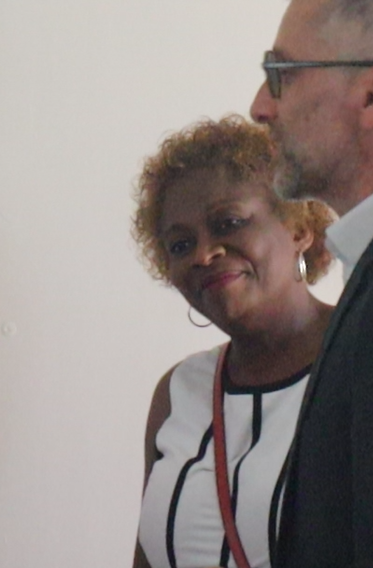
Bassey Williams Has been with the George Marsh Centre for 1 year and a half. She states that,
It has been a long journey to get the center to its current state for the patients and the community to enjoy the space.
To be able to continue supporting services it is her role as project manager to find partners to provide the services, one of whom is Tottenham Sponsors to help with exercise. She says,
The Centre cannot be left empty, and the executive board is ready to work with the Centre.
Frances Whittington Self Management Expert Patient Program

This is Frances Whittington of the Self Management Expert Patient Program.
Her philosophy is,
As the patient, you are the expert.
To support the self-management of Sickle Cell, courses are provided by the program to further the knowledge of the cause of actions/ treatment and awareness of the disorder.
Clark Richardson Senior NHS operational leader

Clark Richardson says,
Refurbishments were made to the center in regard to what people wanted. To provide a safe space for well-being services.
He says the organisation/ Trust is ready to hand the baton on to society/ the patients to define what it is they want from this space.
The vision of the George Marsh site is whatever vision the patients see it fit to be, such as services that provide education, well-being, and finances.
That way the power will then be left with the individuals.
Ruth Marks Clinical health psychologist

Ruth Marks is the Senior Clinical Health Psychologist at Barnet Enfield and Haringey Mental Health NHS.
Leading teams to deliver psychological theapy to the pacients at Hringey.
Dr Morris Cohen
Dr Moriss Cohen a Dr at St. Ann's Hospital says,

St Anns hospital is working towards a business case to obtain the money for a Sickle Cell dedicated seperate Unit.
The day's experience at the George Marsh Centre was very enlightening and I do recommend anybody who has Sickle Cell or Sickle Cell Trait or close family members with this disorder should visit the Centre, especially if feeling isolated.
Was this post informative/helpful in any way?
Yes
No
If you have a query about getting a blog, or in regards to something else please drop a comment in the comments with the text 'I have a query'.
Peace, love, and progress.
75135
Thank you for reading.
Written by Jenetta Greaves
©





































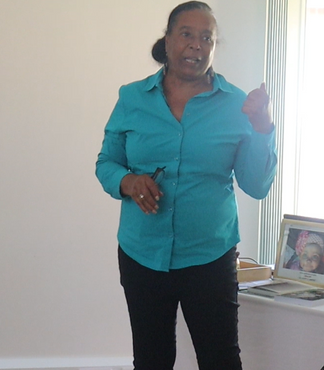



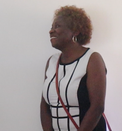











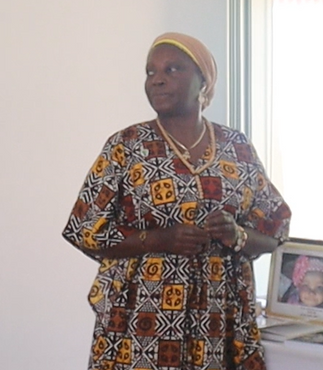























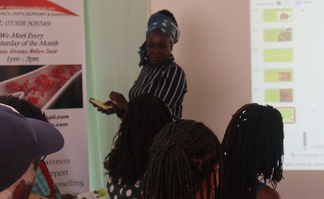





















Comments